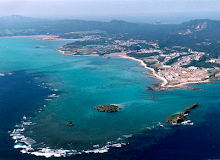A new network called JUCO-NET (Japan-US Citizens for OKINAWA) was launched on March 3, 2010 at a meeting at the House of Representatives. Core members of JUCO include Greenpeace Japan, WWF Japan, the Japan Environmental Lawyers Federation (JELF), Peace Depot, Peace Boat, Okinawan activists, and a network of NGOs and think tanks in the U.S. One of the network's first aims is to take out a large ad in a leading U.S. newspaper to call attention to the issue of Futenma and Henoko.
The JUCO-NET home page, with further information is now online here (Japanese only).
US for Okinawa joined JUCO-NET at the press conference today as a supporting organization, and presented the following statement on behalf of the group.
---------------
JUCO Statement
March 3, 2010
Rose Welsch, US for OKINAWA representative
My name is Rose Welsch, I'm a U.S. Citizen and also a foreign resident of Japan. As someone with experience on both sides of the Pacific, I oppose more bases in Okinawa, and I am not alone.
That's why I and other citizens from the U.S. and from around the world formed US for OKINAWA Peace Action Network. The “US” in our name has two meanings. One is “me, you, him, her—all of us who are concerned about what is happening in Okinawa, and the other is “U.S.” as in United States citizens who support the closure of Futenma and the halt to new and unnecessary military construction in Henoko.
Even though there are some government officials in the U.S. who are strongly pushing for this construction, they don't reflect the will of the American public. Why not? Well, to be honest, because most Americans have never even heard of Futenma or Henoko. Most Americans aren't aware that U.S. Military bases occupy 20% of Okinawa.
When U.S. citizens do learn the facts, however, we are appalled. The more we learn the truth, the more we start to feel strongly that we don't want our government to operate an enormous, dangerous base in the middle of a densely populated city—something that would never be allowed in our own country. We start to strongly feel that don't want our government to destroy a vital marine ecosystem in order to create an unnecessary base in our name. And we don't want the voices of local people who have to live with U.S. bases next to them to be ignored in our name. What we DO want is both the Japanese and U.S. Governments to respect local people, halt new military construction anywhere in Okinawa, and close Futenma.
So, that is why US for OKINAWA is supporting the placement of an opinion ad in a major U.S. newspaper in order to help raise more awareness of this issue. That's why we are writing letters to government officials and in Japan and the U.S. That's why we're circulating a petition and information about Henoko and Futenma in English on the internet. That's why we're also campaigning for better ways to spend $14 billion dollars in taxpayer money—paid by both Japanese citizens like yourselves, and foreign residents like myself in Japan--than on new base construction. Surely there are definitely better ways to spend billions of dollars than on destroying more of Okinawa's biodiversity.
Finally, that's why we are organizing a study program to Okinawa in April, so that more people can see the bases with their own eyes, hear testimony from local people with their own ears, and start a very necessary dialogue on how peace—genuine peace and security--can be constructed in East Asia and the rest of the world, rather than more military bases.
Subscribe to:
Post Comments (Atom)







No comments:
Post a Comment